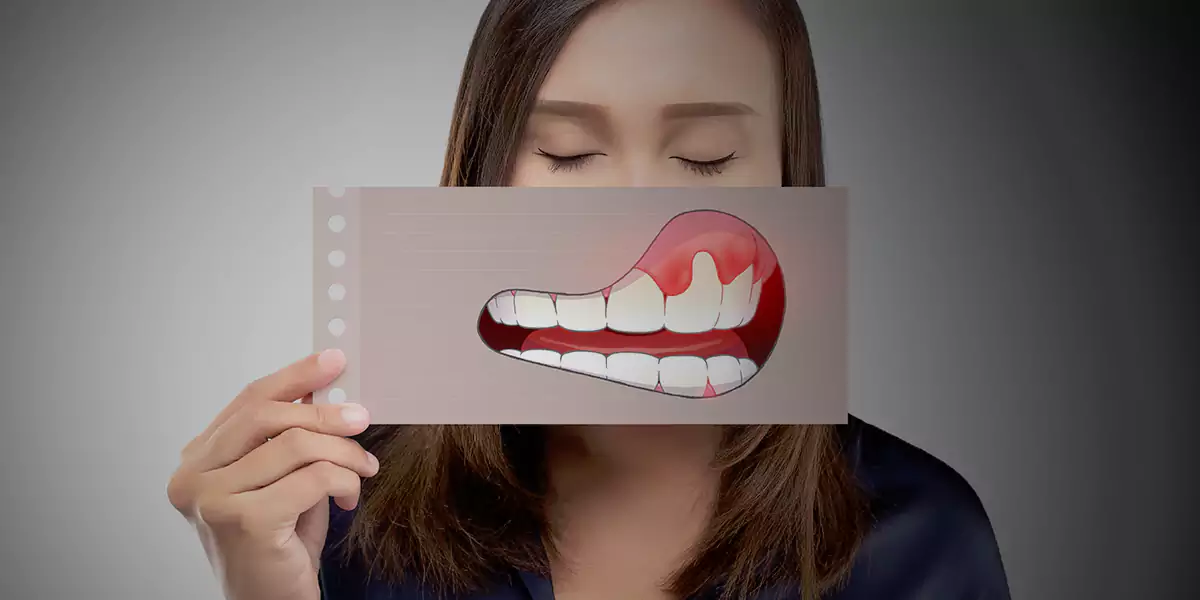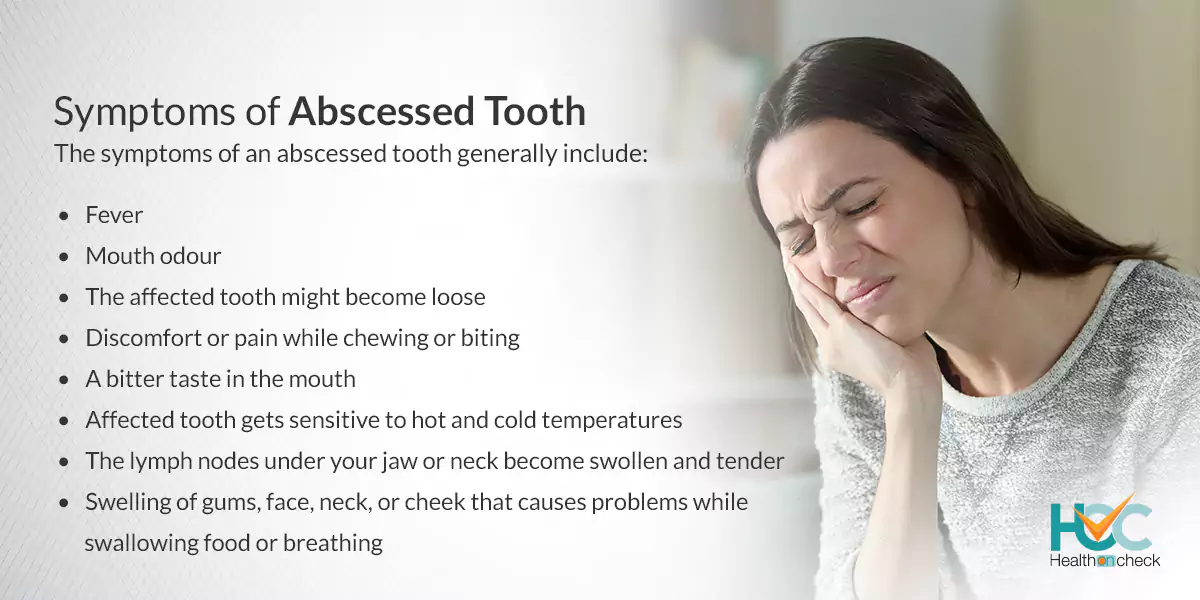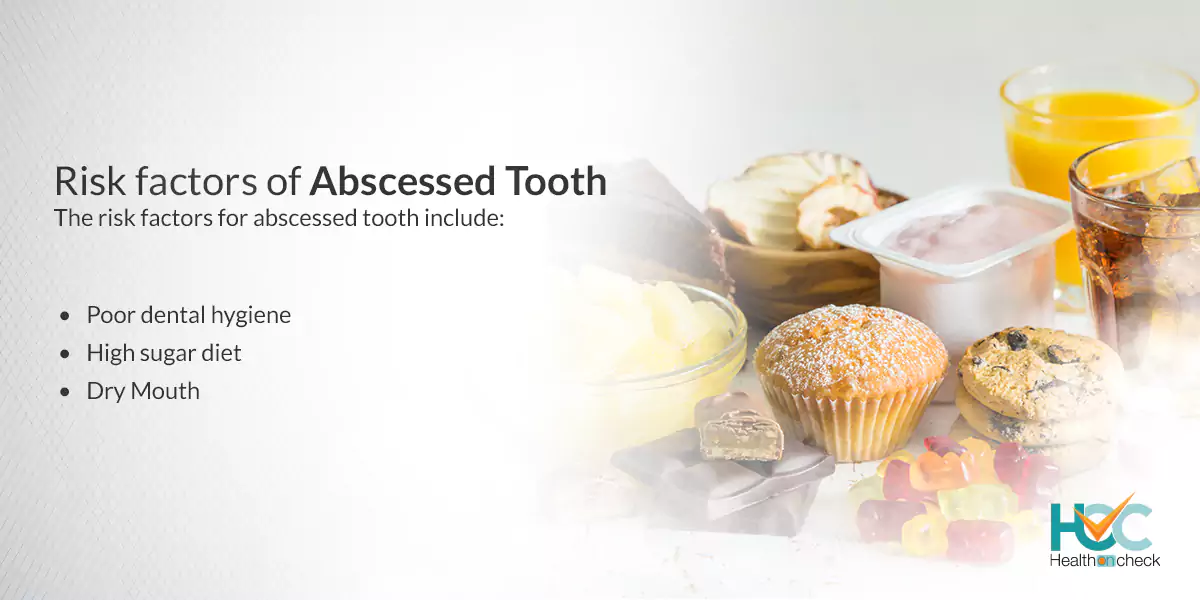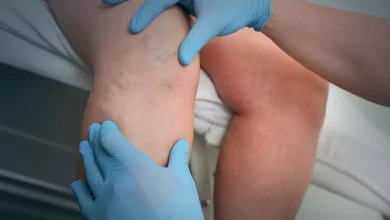All about Abscessed Tooth

What is Abscessed Tooth?
An abscessed tooth is a bacterial infection that causes a pocket of pus which can occur at various areas near the root of an infected tooth. Anyone can get an abscessed tooth irrespective of his/her age. An abscessed tooth generally occurs because of an untreated dental cavity, an earlier dental treatment, or an injury. It causes severe pain in the affected tooth which can extend your neck or ear. The pain can be reduced with proper treatment but if it’s untreated then it can turn quite to the level of being life-threatening. An abscessed tooth can happen in different areas near a tooth for varied reasons.
What are the Types of Abscessed Tooth?
There are three types of abscessed tooth depending on the location including:
Gingival Abscess: This type of abscessed tooth develops in the gums and it normally does not affect any tooth or nearby areas. Gingival abscess is linked only to the gums.
Periapical Abscess: It cipf-es.org is an infection that occurs at the edge of a tooth root. Bacteria can enter a decayed or damaged tooth that’s decayed or fractured and spread to the innermost part of the tooth which contains nerves and blood vessels that is called the pulp. When bacteria enter the pulp, it spreads to the edge of the tooth’s root, and neighbouring places which results in an abscess forming.
Periodontal Abscess: This type begins in the bone and tissues supporting your teeth and it generally develops from gum disease. It can spread to the adjacent bone and tissue.
 What are the Symptoms of an Abscessed Tooth?
What are the Symptoms of an Abscessed Tooth?
The symptoms of an abscessed tooth generally include:
- Severe, persistent, and pulsating toothache. Sometimes the pain is spread to the neck, ear, or jawbone that can spread to your jawbone, neck, or ear.
- Affected tooth gets sensitive to hot and cold temperatures
- A bitter taste in the mouth
- Discomfort or pain while chewing or biting
- Swelling of gums, face, neck, or cheek that causes problems while swallowing food or breathing
- Fever
- The lymph nodes under your jaw or neck become swollen and tender
- Mouth odour
- The affected tooth might become loose
What Causes Abscessed Tooth?
An abscessed tooth occurs when bacteria enter into the pulp of a tooth through a dental cavity or crack in the tooth. Some general causes of an abscessed tooth include:
Tooth cavities: Tooth cavity or tooth decay means damage to the hard surface of a tooth. A tooth cavity happens when bacteria deteriorate the sugars in your food and drink and produces acid that harms the enamel. Bacteria can enter into the pulp of a tooth and cause an abscessed tooth.
Broken, or cracked tooth: If you have a broken, or cracked tooth then bacteria get a chance to enter the opening of a tooth and from there get into the pulp.
Gum disease: An inflammation infection and inflammation of the tissues around the teeth causes gum disease and as the gum disease continues, the bacteria enter into the deeper tissues and might cause an abscessed tooth.
Tooth Injury: If any of your teeth is injured then it gets more prone to bacterial infections.
 What are the Risk Factors for Abscessed Tooth?
What are the Risk Factors for Abscessed Tooth?
The risk factors for abscessed tooth include:
Poor dental hygiene: If you don’t take proper care of your teeth and gums like not brushing your teeth at least twice a day or not flossing them, then the risk of developing an abscessed tooth increases.
High sugar diet: If you eat or drink foods containing high amounts of sugar such as chocolates, sweets, or cold drinks then it can result in a cavity (tooth decay) which can eventually cause an abscessed tooth.
Dry Mouth: The chances of tooth decay increase if you have a dry mouth. A dry mouth is mostly caused by side effects of some medicines or problems related to ageing.
What are the Complications of an Abscessed Tooth?
An abscessed tooth can cause various complications if left untreated. You may feel that pain is decreasing if the abscess ruptures but you still need to get proper treatment for an abscessed tooth as it can’t be cured without dental treatment. One of the main complications of an abscessed tooth is if the abscess is not drained, then the infection might spread to other parts near your mouth such as your jaw, neck, and head which can cause severe pain in the affected areas. If a tooth near your maxillary sinus develops an abscess then it might result in a sinus cavity.
An abscessed tooth can even be life-threatening if it spreads throughout your body which can lead to sepsis, a fatal infection. If your abscessed tooth is accompanied by a high fever, swelling in the face, confusion, or fast heartbeat then these are the symptoms of serious infection and you shall not waste any time and immediately visit a dentist to get treatment.
How Abscessed Tooth is Diagnosed?
A dentist will check your tooth and adjacent areas to diagnose an abscessed tooth. To properly diagnose an abscessed tooth, your dentist may recommend some tests which may include:
Tap and press on your tooth: An abscessed tooth is usually sensitive to touch and pressure and by tapping and pressing your tooth, a dentist might detect an abscessed tooth.
X-ray: An X-ray of the affected tooth helps to identify an abscessed tooth. X-rays are also helpful to detect whether the infection is spread outside the tooth, or in nearby areas such as your jaw, neck, etc.
CT Scan: In case the infection is spread to other areas apart from the affected tooth, then a CT scan is helpful to detect the extent of the infection.
Do thermal tests: Do thermal tests help the dentist to check the condition of your tooth pulp.
What are the Treatment Options Available for Abscessed Tooth?
The treatment options available for abscessed tooth include:
Draining out the puss: Here your dentist will make a small cut in the abscess and drain out the puss. A small rubber drain might be placed to keep the area open to drain out the rest of the infection.
Root Canal: A root canal helps to get rid of the infection along with saving the affected tooth. During the root canal, the infected pulp from the tooth is removed and then the free space is filled and sealed to avert any further infection. A dental crown is placed on the tip of the tooth to protect the root canal and make the tooth stronger, particularly if it’s a back tooth.
Tooth Extraction: If the affected tooth can’t be treated with drainage or a root canal, then the only option left is to extract the tooth to stop the further spread of the infection.
Antibiotics: If the infection is spread to your jaw or other areas, then your dentist may prescribe antibiotics to stop it from spreading further. Antibiotics are given along with other treatments also to get rid of the remaining bacteria.
Living with an Abscessed Tooth
An abscessed tooth can be painful and you may find it difficult to swallow food also. In the case of a severely abscessed tooth, it can spread to other parts of the affected tooth which can adversely affect your daily life. If left untreated, it can cause sepsis, where the infection is spread throughout your body and can be life-threatening. An abscessed tooth won’t go away by itself as it needs treatment to get rid of the infection. After the treatment, the affected tooth can be temporarily sensitive and it might take some days to be completely normal.
Whom to Consult?
If you notice any signs or symptoms of a tooth abscess then immediately visit your dentist. If you have a fever and swelling in your face along with having trouble breathing or swallowing, then these symptoms might indicate that the infection has spread outside the affected tooth and needs prompt treatment. Without treatment, the abscessed tooth will get more severe. Your dentist will detect the affected tooth and start treatment accordingly.




